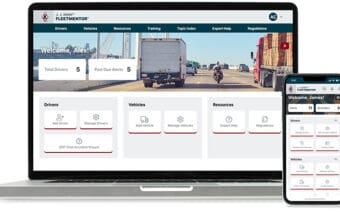
June 28, 2023
KAUKAUNA – Midwest Carriers, a family-owned trucking company based in Kaukauna, knows a thing or two about a sound employee healthcare program.
The total logistics partner located at 2001 Hyland Ave. in Kaukauna, recently received the 2023 Health Plan Hero Award at a reception in Washington D.C.
The award program, launched last year in response to nationwide increases in health coverage premiums and deductibles, is hosted by the national patient advocacy organization Patients Rising.
The nonprofit recognizes innovative health plans that expand employee access to care while also lowering employer spending, and at the same time are competitive due to increased workforce health, productivity and savings.
‘An example to others’
Midwest Carriers was recognized for its health plan that created a nurse navigation program and reduced company healthcare expenses by 17.6%, while also removing its deductible and reducing its premiums by more than 20% for patients.
“We’re honored to be recognized for the hard work we have put into offering our employees and their families world-class healthcare different from the status quo,” Renae Langel, vice president of human resources and risk management at Midwest Carriers, said.

Renae Langel, vice president of HR and risk management at Midwest Carriers, receives the 2023 Health Plan Hero Award at a reception in Washington D.C. Submitted Photo
For too long, Langel said Midwest Carriers went with what it thought was the “norm” and paid the price in premiums and “unnecessary out-of-pocket expenses.”
“We realized the only way to save money was to break away from the industry standard and offer better healthcare for less to our valued employees,” she said. “Receiving the Health Plan Hero Award helps us to serve as an example to other employers in our community of what kind of positive change is possible.”
Midwest Carriers was honored alongside ten other businesses at the awards reception in D.C. and participated in expert roundtable discussions with employees, human resource representatives, patient advocates, CEOs and healthcare benefit design experts.
“For us, it’s been something we’ve been battling for years – how we can manage our insurance costs,” Eric Van Handel, president of Midwest Carriers, said. “When Renae (Langel) was hired a few years back, she prioritized addressing that situation.”
Like many other businesses, Van Handel said Midwest Carriers is looking for qualified drivers/workers, and reducing healthcare costs has greatly benefited the company in terms of talent attraction and retention.
“It’s mostly dealing with our recruiting process,” he said. “Because we take care of our employees in a lot of ways and the pay is good, that compensated for a little bit higher premiums – which I still consider were average compared to other companies. Specifically, when truck drivers were calling and putting out feelers, we consistently heard from them, ‘Your premiums are too high, but everything else is fantastic.’”
Now, Van Handel said, we are competitive in recruiting drivers.
“It’s no longer a tough sell – we use it to our advantage now,” he said.
How the company did it
Van Handel said to eliminate the deductible and reduce premiums for its employees, Midwest Carriers teamed up with Green Bay-based Avergent – a company that aims to educate, empower and equip organizations to raise, reclaim and rebuild benefits.
“Ultimately, we haven’t had to take on more costs,” he said. “It’s been about finding better prescription pricing, having collaborative care members, etc. Our employees are encouraged – whenever they need surgery or another procedure – to call Avergent, and they will walk them through the best option for them.”

Eric Van Handel
Van Handel said it’s more about “strategically working as an entire team.”
“The employees have bought into the fact we have lowered premiums because we are making smart decisions,” he said.
Van Handel said there is much more that companies can do when “dealing with insurance.”
“Like others, we thought we were simply stuck with it – costs would rise 5-10% per year and we had to deal with it,” he said. “You can do something about it. A company like Avergent will gain lots of traction – they are trailblazers in the industry.”
Van Handel said Midwest Carriers’ nurse navigator program works well because they “have experience from other cases and know what’s best.”
“We had one patient go for stem cell therapy into his spine,” he said. “Instead of going into surgery with potential risk and complications – which would have cost tens of thousands of dollars – these injections were relatively reasonable (in cost). Without collaborative care, they never would have thought about doing it that way – it would have been surgery and all the things that come with that. These shots have been the best thing for him, and he said he’s never felt better.”
Van Handel said that’s just one example.
“Some prescription drugs cost $15,000 per month,” he said. “We’ve been able to direct that to different places to save costs. The statistics show the most expensive option out there isn’t always the best option.”
Van Handel said Midwest Carriers is building a new corporate headquarters within the next year and plans include incorporating a workout facility within its walls.
“We encourage our drivers to park further away from the truck stop location to get some steps in,” he said. “We know it’s tough always getting exercise in with being on the road. Being healthy is a good first step in reducing healthcare costs.”
More about Patients Rising
Patients Rising is a nonprofit organization serving patients and caregivers living with chronic or rare illnesses and disabilities.
It works directly with healthcare users in learning, seeking and advocating for access to the care they need.
“Through this program, Patients Rising wants to identify and celebrate employers who are doing the right thing – expanding access to care while lowering costs for patients – without losing a lot financially as well,” Terry Wilcox, co-founder and CEO of Patients Rising, said.

Terry Wilcox
According to the website healthcarehero.net, the average premium for health coverage in 2020 was $7,470 for single coverage and $21,342 for a family plan through employer-sponsored insurance.
Additionally, the site notes family premiums have increased by an average of 22% from 2015 to 2020, and deductibles for single-covered workers rose by 25% during that same period.
The average deductible for single-covered workers was $1,644 in 2020.
“Many people might not know the ins and outs of their health insurance, but most don’t need to,” Wilcox said. “For many people, it’s a wellness check per year and maybe a few other minor things – it’s fairly unnoticeable.”
However, Wilcox said some of the people – the chronic and rare-disease patients that have life-threatening illnesses like cancer or diabetes – Patients Rising works with “are using their health insurance every day.”
“They are hit with all these things they never had to deal with before,” she said. “About 50% of denials in health insurance go uncontested. Of the contested ones, 75% of those make it through – patients need to be educated.”
Wilcox said employers are the primary payers of health insurance in this country, so they must also be aware.
“Not every healthcare plan covers everything,” she said. “That’s not realistic or even financially sound, but getting access to the treatment and doctor they trust has to be easy to understand – and affordable.”
Wilcox said because healthcare costs are rising, more costs are being pushed onto the patient.
“Therefore, there’s been an uproar from the American people who are having to pay for these things – it’s not sustainable or affordable,” she said. “Healthcare has reached a point where costs for many Americans are unsustainable – as it is set up now. There have to be changes, but it will take a movement. I believe some changes have already been made, but it might take a few years to see that statistically.”
Many of the Health Plan Hero Award winners, Wilcox said, are small businesses.
“They are not these huge corporations,” she said. “They are trying to afford healthcare coverage for 150, 200 or maybe 500 employees.”
Wilcox said one of the main things Midwest Carriers – and the other Health Plan Hero Award recipients – did was reduce premiums and provide better healthcare to its employees.
“Midwest Carriers employees can access zero-dollar specialty care and medications if they work with the nurse navigators to help direct them to the best care for whatever their needs are,” she said. “Sometimes, the best care isn’t the most expensive hospital in town – it might be the surgery center down the street.”
For more information on Patients Rising, visit patientsrising.org.
 TitletownTech is nearly on the clock
TitletownTech is nearly on the clock A shining ‘Star’ of restoration and community philanthropy
A shining ‘Star’ of restoration and community philanthropy








